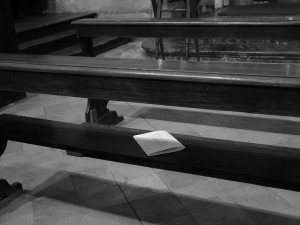 In a new article for Religion Dispatches, Elizabeth Drescher, responds to a piece by Katherine Stewart and attempts to clarify some of the discrepancies and difficulties in finding an accurate term to describe religious “nones.” Whereas Katherine Stewart defines them as “unbelievers” or “atheists,” Drescher points out that according to a recent Pew Study, “nones” actually do practice religion, however inconsistent or eclectic their practice might be.
In a new article for Religion Dispatches, Elizabeth Drescher, responds to a piece by Katherine Stewart and attempts to clarify some of the discrepancies and difficulties in finding an accurate term to describe religious “nones.” Whereas Katherine Stewart defines them as “unbelievers” or “atheists,” Drescher points out that according to a recent Pew Study, “nones” actually do practice religion, however inconsistent or eclectic their practice might be.
By far, as the recent Pew report and other studies have shown, so-called “Nones” are believers in God or a higher power (68%), see themselves as religious or spiritual (65%), see religion as having important social value (69%) despite what they see as an excessive focus on power, rules, and politics (68%). Nearly half (41%) pray at least weekly.
Drescher also notes that while Pew “attempted to sidestep the difficulties of the term ‘Nones,’ as [she] noted here, by preferring the term ‘religiously unaffiliated,'” this doesn’t quite solve the problem either.
That is, the term “religiously unaffiliated,” like the more popular term “nones,” describes a sociological category that can be studied across many demographic dimensions (age, gender, political orientation, etc.), but which, unlike the Buddhists, Catholics, Jews, Mormons, Presbyterians and so on that fall into the “religiously affiliated” category, otherwise have no institutionalized affinity.
Due to their range of beliefs and practices, “nones” are hard to define as a group, nor would then join together to advocate as a group for political or other social issues. Drescher points out the further irony in attempting to define them as one cohesive group: by defining themselves as “nones” they are actively trying to dissociate from any one religious tradition. Read the full essay here. Elizabeth Drescher is an SSRC New Directions in the Study of Prayer grantee.












